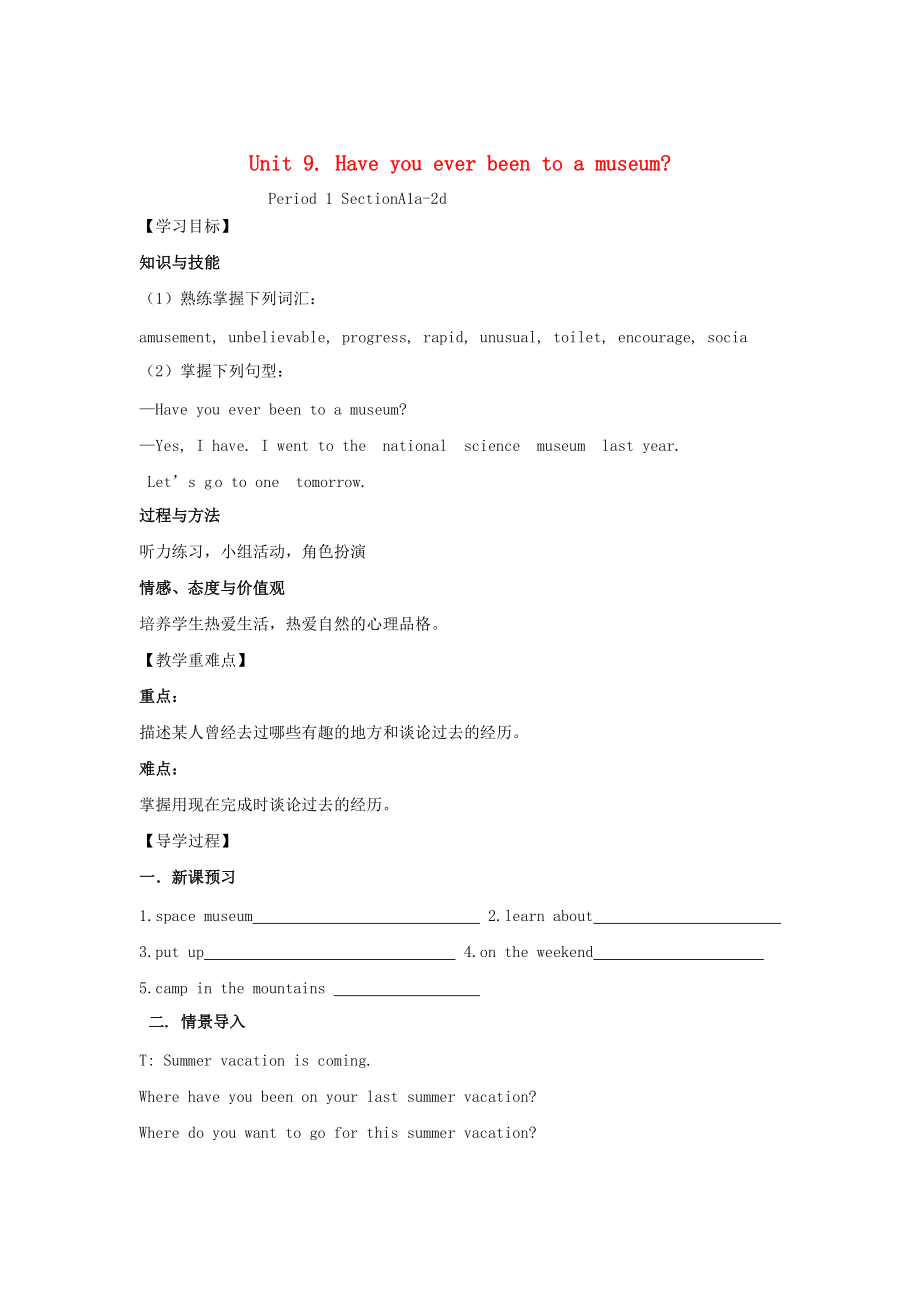《八年級(jí)英語下冊(cè) Unit 9 Have you ever been to a museum Period 1導(dǎo)學(xué)案人教新目標(biāo)版》由會(huì)員分享��,可在線閱讀��,更多相關(guān)《八年級(jí)英語下冊(cè) Unit 9 Have you ever been to a museum Period 1導(dǎo)學(xué)案人教新目標(biāo)版(4頁珍藏版)》請(qǐng)?jiān)谘b配圖網(wǎng)上搜索�����。
1��、 精品資料
Unit 9. Have you ever been to a museum?
Period 1 SectionA1a-2d
【學(xué)習(xí)目標(biāo)】
知識(shí)與技能
(1)熟練掌握下列詞匯:
amusement, unbelievable, progress, rapid, unusual, toilet, encourage, socia
(2)掌握下列句型:
—Have you ever been to a museum?
—Yes, I have. I went to the national science
2��、museum last year.
Let’s go to one tomorrow.
過程與方法
聽力練習(xí)��,小組活動(dòng)����,角色扮演
情感、態(tài)度與價(jià)值觀
培養(yǎng)學(xué)生熱愛生活��,熱愛自然的心理品格�����。
【教學(xué)重難點(diǎn)】
重點(diǎn):
描述某人曾經(jīng)去過哪些有趣的地方和談?wù)撨^去的經(jīng)歷。
難點(diǎn):
掌握用現(xiàn)在完成時(shí)談?wù)撨^去的經(jīng)歷�����。
【導(dǎo)學(xué)過程】
一.新課預(yù)習(xí)
1.space museum 2.learn about
3.put up
3����、 4.on the weekend
5.camp in the mountains
二. 情景導(dǎo)入
T: Summer vacation is coming.
Where have you been on your last summer vacation?
Where do you want to go for this summer vacation?
三.合作探究
1. 個(gè)人或小組讀1a的單詞和對(duì)話。
2.聽錄音完成1b�����。
3. 對(duì)話練習(xí)1c.
看2a中的地圖�����,我們
4����、一起來編對(duì)話。
A: Have you ever been to ? B: Yes, I have. / No, I haven’t.
A: When did you go there? B: I went there
A: How did you go there? B: I went there by
A: Where are you going next week? B: I’m going to
A: How are you going there? B:
5��、
A: Who are you going with ? B:
4. 討論
(1)Have you ever been to an amusement park?和I went to Fun Times Amusement Park last year.這兩句話時(shí)態(tài)上有什么不同��?為什么?
_____________________________________________________________________
(2)根據(jù)下面三個(gè)句子����,討論neither的用法:
①M(fèi)e neith
6�����、er, Let’s go to water city .
②Neither answer is right.
③Neither of them knows me.
________________________________
5��、聽錄音完成2a,2b����。
6.對(duì)話練習(xí)2c
7.角色扮演2d.
四.點(diǎn)撥總結(jié)
現(xiàn)在完成時(shí)(一)
I.用法:現(xiàn)在完成時(shí)表示過去發(fā)生的動(dòng)作對(duì)現(xiàn)在造成的影響或結(jié)果。常與下列時(shí)間狀語連用:just , already, yet, ever, never, before, se
7�����、veral times��。 現(xiàn)在完成時(shí)不能和表示過去的時(shí)間(如:yesterday, last, year, in 1976, two days ago, just now, when she came in 等)連用����。
(1)現(xiàn)在完成時(shí)表示過去發(fā)生的動(dòng)作對(duì)現(xiàn)在的影響。
I have studied English. 表示I know a little English.
He has already come back. 表示He is here now.
常與already, yet, just, recently, ever, never, before等表示不確定時(shí)間的時(shí)間
8���、狀語連用�����。
(2)現(xiàn)在完成時(shí)表示從過去一直持續(xù)到現(xiàn)在的動(dòng)作或狀態(tài)����。
She has been ill for 3 days. He has worked in the bank since 1990.
此時(shí),句中謂語動(dòng)詞通常是延續(xù)性動(dòng)詞����,且常與表示一段時(shí)間的時(shí)間狀語連用。如:these days, all this year, recently, for +時(shí)間段以及since+時(shí)間點(diǎn)等等���。
II. 構(gòu)成:have / has +動(dòng)詞過去分詞
(1)has用于主語是第三人稱單數(shù)���,have用于其它人稱。
(2)動(dòng)詞的過去分詞構(gòu)成分為規(guī)則動(dòng)詞和不規(guī)則動(dòng)詞����。規(guī)則動(dòng)詞在詞尾加ed,其規(guī)
9���、則與過去式一樣���。
不規(guī)則動(dòng)詞要記住��。例如:take-taken, go-gone等�����。
III.區(qū)分 have/has been to 與have/has gone to
have /has been to 和 have/has gone to 都是指已經(jīng)去了某個(gè)地方,但是 have /has been to 強(qiáng)調(diào)的是曾經(jīng)去了某個(gè)地方并回來了���; have/has gone to強(qiáng)調(diào)的是去了某個(gè)地方還沒有回來���。
--Have you ever been to Shanghai? --Yes, several times.
-- Where is Mr. Wang??-- He ha
10��、s gone to Shanghai.
五.訓(xùn)練評(píng)價(jià)
單項(xiàng)選擇
1. —Have you ever been to an aquarium? —No, _____.
A. I have B. I am not C. I haven’t D. I hasn’t
2. —I’ve never been to a water park. — _______
A. Me, too B. Me, neither. C. Me also. D. Me both.
3. Has the train _____ yet?
A. got to B. reach
11�����、ed C. arrived D. arrived at
4.The teacher asked _____.
A. what’s your name B. what was your name
C. what your name is D. what your name was
5.—Do you mind if I stay here a little longer? —_____.
A. No, you can’t B. Yes , you may C. Certainly not D. Yes, not at all
6
12����、.How long has his brother _____ the book?
A. kept B. bought C. lent D. borrowed
7.I’ve never seen such a fine picture _____.
A. ago B. before C. yet D. later
8.—Has the foreigner been to many interesting places in Beijing?—Yes, but he has not _____been to
13、 many other parts of China.
A. already B. still C. yet D. never
完成下列句子
1.乘電梯去12樓
2.你知道他是否有一些重要的信息要告訴我嗎?
3.昨天,
14��、老師說地球是圍繞著太陽轉(zhuǎn)的
六.學(xué)習(xí)反思
開心 ,我學(xué)會(huì)了:
1.
2.
3.
加油 ��,這些我還不懂:
1.
2.
3.
 八年級(jí)英語下冊(cè) Unit 9 Have you ever been to a museum Period 1導(dǎo)學(xué)案人教新目標(biāo)版
八年級(jí)英語下冊(cè) Unit 9 Have you ever been to a museum Period 1導(dǎo)學(xué)案人教新目標(biāo)版

